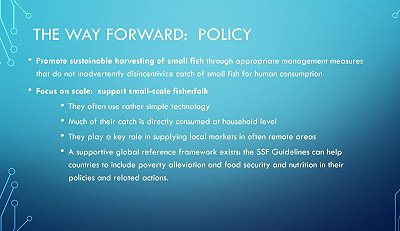Session 5 Collecting the threads
In the concluding session, Molly Ahern of FAO extracted some key challenges to sustainable fish food systems from the previous presentations and discussions. She mentioned, among others, the challenge to maintain quality and reduce post-harvest losses, the need to support women processors and traders with long-term skill enhancement and access to credit as they make up a very significant part of the protagonists along the value chains, but tend to work under particularly difficult conditions. That might also facilitate uptake of innovations which do not lead to displacement by financially stronger investors. Greater attention to informal markets and trading and reducing inequalities in access and consumption was warranted. At the same time, urbanisation and associated changes in diets were leading to unintended reduction of intake of nutrious fish food.
 Only a few comments by speakers can be included here. Maarten Bavinck, one of the key organisers highlighted a social science perspective underlining that it was important to research the different contexts and not jump to conclusions, always using a human rights approach with a focus on the most vulnerable segments of the population. How can governance systems evolve that they prioritise small-scale fisheries in line with the SSF Guidelines and prevent e.g. the ethically inacceptable choice between food for people or feed for aquaculture. That had to go hand in hand with preventing SSF products becoming priced out of reach of financially poor consumers.
Only a few comments by speakers can be included here. Maarten Bavinck, one of the key organisers highlighted a social science perspective underlining that it was important to research the different contexts and not jump to conclusions, always using a human rights approach with a focus on the most vulnerable segments of the population. How can governance systems evolve that they prioritise small-scale fisheries in line with the SSF Guidelines and prevent e.g. the ethically inacceptable choice between food for people or feed for aquaculture. That had to go hand in hand with preventing SSF products becoming priced out of reach of financially poor consumers.
V. Vivekanandan echoed these concerns commenting that many local organisations he interacted with in India had a rather poor understanding of larger dynamics in the sector. Supporting their organisations or getting them organised if they weren't was crucial for improvements. Partnerships with civil society organisations and researchers were among the useful responses to these gaps. He strongly argued for carrying out joint pilot projects and experimenting before trying to scale. That would be an adequate risk management strategy.
The entire seminar was recorded and will shortly be made available for viewing on YouTube.








